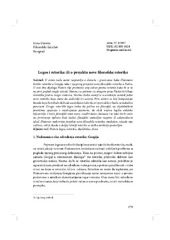Logos i retorika - ili o projektu nove filozofske retorike
Logos and rhetoric: Or on the limits of Plato's philosophical rhetoric
| dc.creator | Deretić, Irina | |
| dc.date.accessioned | 2021-10-12T10:42:38Z | |
| dc.date.available | 2021-10-12T10:42:38Z | |
| dc.date.issued | 2007 | |
| dc.identifier.issn | 1820-0958 | |
| dc.identifier.uri | http://reff.f.bg.ac.rs/handle/123456789/637 | |
| dc.description.abstract | U ovom radu autor raspravlja o dometu i granicama kako Platonove kritike retorike u Gorgiji, tako i njegovog projekta nove filozofske retorike u Fedru. U ova dva dijaloga Platon nije promenio svoj odnos prema retorici kako bi se to na prvi pogled moglo učiniti. Naime, i u jednom i u drugom spisu Platon kritikuje retoričku praksu svoga vremena. Novina Fedra sastoji se u uvođenju zamisli jedne nove retorike koja mora da zadovolji tri uslova. Prvi zahtev se tiče kompozicije beseda koja bi trebalo da bude sastavljena tako da svi njeni delovi budu neraskidivo povezani. Drugo, retorički logos treba da počiva na filozofiji, na dijalektičkim pravilima spajanja i razdvajanja pojmova, da sledi nužnu logiku eidetske hijerarhije. I treće, filozofski retor mora "voditi duše" slušaoca i to tako što bi utiče na formiranje njihove duše sledeći filozofski utemeljen vaspitni ili zakonodavni ideal. Platonov nedovršen projekat nove filozofske retorike, međutim, nikada nije zaživeo, niti je ikada u daljoj istoriji retorike sa toliko ambicija postavljen. | sr |
| dc.description.abstract | The author discusses the scope and limits of both Plato's criticism of rhetoric in the Gorgias and of his project of new philosophical rhetoric in the Phaedrus. In these two dialogues Plato does not change his attitude towards rhetoric as it may appear at first glance. In both of them he radically criticizes the rhetorical practices of his time. The novelty of the Pheadrus is the introduction of a new rhetoric, based on philosophy, which needs fulfill three conditions. Firstly, the rhetorical logoi should be composed in such manner that they represent inseparable parts of the organic whole of an oration. Secondly, rhetorical speeches should be based on the strict dialectical rules of collection and division. Finally, philosopher rhetorician must 'guide the souls' of his listeners in such a way that he radically influences the forming of their souls by following the philosophically founded educational or legal ideal. Plato's unfinished project was never fully accomplished nor was it ever again set up with such great ambition. | en |
| dc.publisher | Univerzitet u Novom Sadu - Filozofski fakultet - Odsek za filozofiju, Novi Sad | |
| dc.rights | openAccess | |
| dc.source | Arhe | |
| dc.subject | retorika | sr |
| dc.subject | Platon | sr |
| dc.subject | logos | sr |
| dc.subject | duša | sr |
| dc.subject | dijalektika | sr |
| dc.subject | soul | en |
| dc.subject | rhetoric | en |
| dc.subject | Plato | en |
| dc.subject | logos | en |
| dc.subject | dialectic | en |
| dc.title | Logos i retorika - ili o projektu nove filozofske retorike | sr |
| dc.title | Logos and rhetoric: Or on the limits of Plato's philosophical rhetoric | en |
| dc.type | article | |
| dc.rights.license | ARR | |
| dc.citation.epage | 191 | |
| dc.citation.issue | 8 | |
| dc.citation.other | 4(8): 177-191 | |
| dc.citation.spage | 177 | |
| dc.citation.volume | 4 | |
| dc.identifier.fulltext | http://reff.f.bg.ac.rs/bitstream/id/2165/634.pdf | |
| dc.identifier.rcub | https://hdl.handle.net/21.15107/rcub_reff_637 | |
| dc.type.version | publishedVersion |

